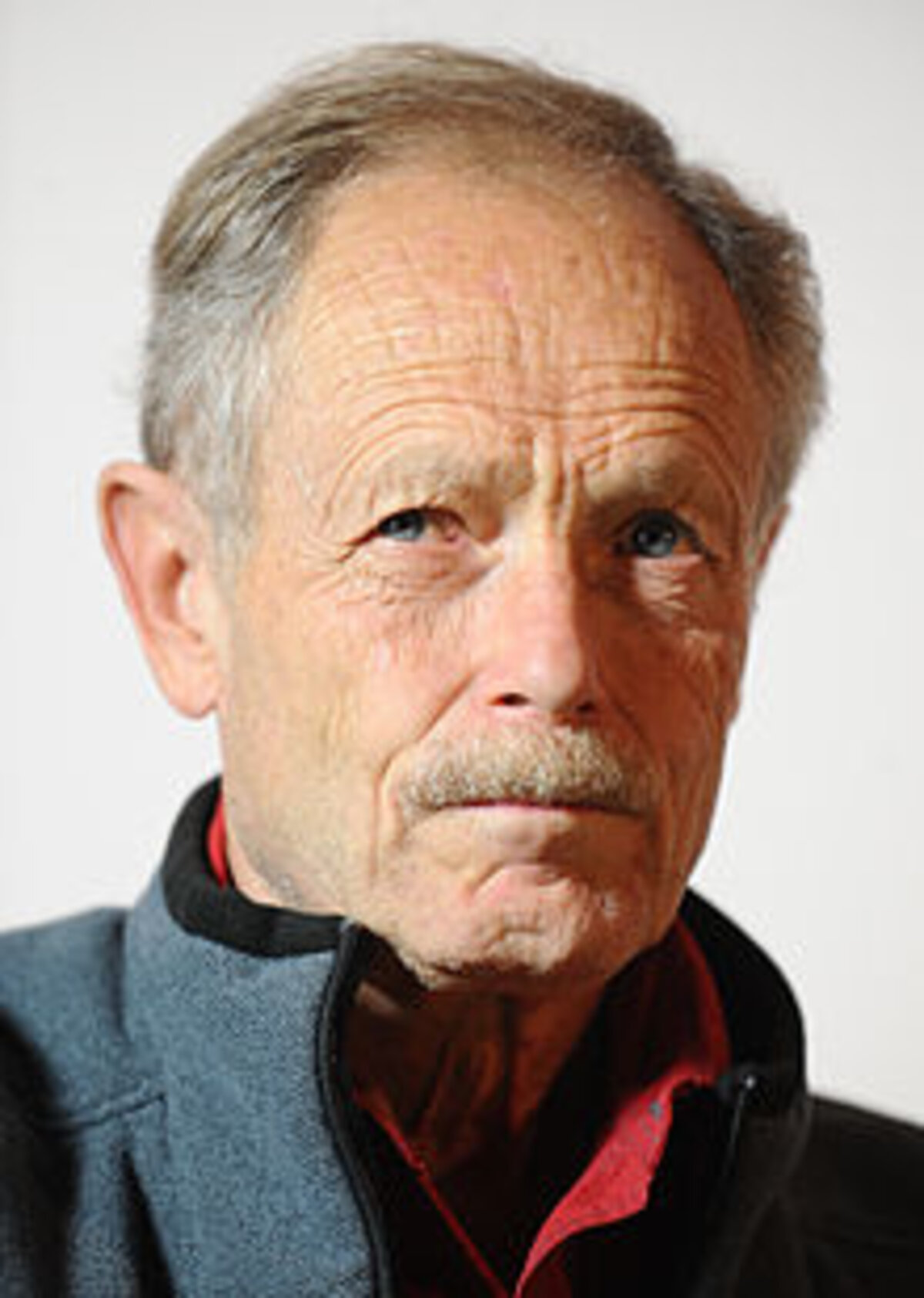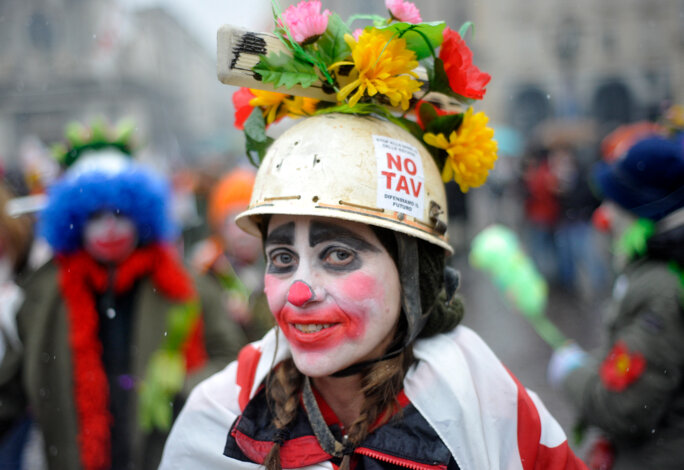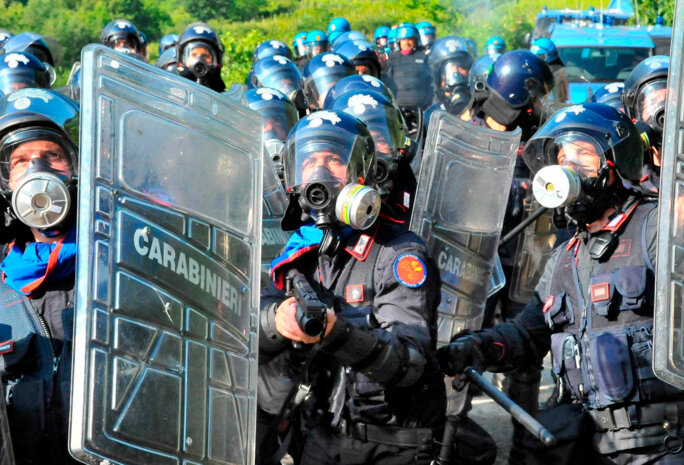As he welcomes Mediapart into his home, celebrated Italian novelist Erri de Luca obligingly spells out the legal predicament he finds himself in. “I was sent for trial for incitement to commit a crime, because I said that it was necessary to sabotage the work on the Lyon-Turin railway line or TAV (Treno Alta Velocita),” he says, speaking in French. “A crime....” he mutters as he enters the kitchen, the main room in this house that he built with his own hands thirty years ago in the countryside outside Rome.
De Luca, who worked as a truck driver and a bricklayer before becoming an acclaimed poet and novelist, has been pursued legally by the Franco-Italian company behind the project, LTF or Lyon Turin Ferrovoaire, since September 2013. Having refused a trial held behind closed doors, de Luca appeared in open court in Turin on January 28th, 2015, charged with incitement and faces five years in prison if found guilty. The next hearing will be on March 16th, when the judge will hear five witnesses – two for the prosecution and three for the defence – and question de Luca himself before setting a date for the final pleadings.
When Mediapart met Erri de Luca on February 22nd the silence of the writer's home contrasted with the noise of the crowds in the streets of Turin. There some 10,000 protesters – 4,000 according to Italian police – demonstrated against the forthcoming agreement on Tuesday February 24th between French president François Hollande and Italian prime minister Matteo Renzo committing both countries to constructing a 57km tunnel through the Alps which is at the heart of the Lyon-Turin railway project. This tunnel will cost an estimated 8.5 billion euros to build and will pass between the Susa valley in Italy and the Maurienne valley in France. At a press conference in Paris, President Hollande announced that work will begin on the line in 2016. It was also revealed that the company who will carry out the construction of the tunnel will be TELT (Tunnel Euralpin Lyon-Turin), the successor company to LTF. “Two years ago Matteo Renzi was resolutely against this project,” notes Erri de Luca.
At 64, this former extreme-left activist lives alone and spends his time reading and translating sacred texts from ancient Hebrew. His translation of the book of Esther was published at the same time as La Parole contraire ('The Opposing View'), a tract he wrote to prepare his defence following the complaint by LTF, and which appeared in both France and Italy in January.
Since his court appearance Erri de Luca has been unable to throw himself into his writing and waits impatiently for a verdict whose date is as yet unknown.
Mediapart: Erri de Luca, when you described the sabotage of the work on the Lyon-Turin railway line as “necessary”, were you aware of the consequences of those words?

Erri de Luca: I've been close to the struggle in Susa valley for about ten years. I went on demonstrations, I often made public interventions and each time I repeated that this project should be sabotaged, in the political sense of the term: everything must be done to hinder the work. 'To sabotage'. There, that's the idea that I often expressed. But in May 2013, for the first time, I said it to a newspaper. They telephoned me for a reaction. All I did was to repeat what I had been saying for years in meetings and which had never posed a problem until then. The fact that it was said to the press apparently made it become a problem.
Mediapart: And you persist in saying this?
E.L.: 'To sabotage' is a noble verb, used by Gandhi and Mandela. I will continue to say it for I am convinced that this work must be stopped. To complete this Lyon-Turin line they will have to dig through mountains stuffed with asbestos, which would cause massive pollution. Fighting against this project is a legitimate defence against physical, political and chemical aggression … the life of an entire valley depends on it. Without mentioning the fact that this infrastructure is pointless!
Mediapart: Why is this Lyon-Turin line pointless?
E.L.: Because there is already a railway link that is under-used, working at just 30% capacity! This new 57km [tunnel] that they want to build will also not even be high-speed! The trains will run at normal speed. And even if it was indispensable you would have to stop it because it's criminal to puncture holes in mountains that contain deposits of pitchblende, a highly-radioactive material, and to scatter asbestos.
Mediapart: The resistance to the Lyon-Turin line is much stronger on the Italian side of the Alps than in France. Why is that?
E.L.: The Lyon-Turin line is a Franco-Italian project. It's an enormous project for which, incidentally, no one has managed to work out exactly how many billions of euros it could cost, nor what the contribution of the European Union will be. The cour des comptes [audit commission] in France has already raised objections on this issue. In France the relationship between the costs and the profits from a works project are very clear and more obvious. But here in Italy the cost-profit relationship is: costs for the state and profits for private companies. That's why there is absolutely no interest in carrying out useful projects - the important thing is simply to carry them out! In Italy there are hundreds of projects, infrastructure projects, that have not been completed. No one is ever guilty, no one repays any money. These big infrastructure projects are a way of wasting state money to the benefit of private enterprises who are, of course, connected with political parties. It's not your average company that wins the tenders, no, it's always companies connected to political parties. Because here there is a culture of getting round rules and favouritism.
Mediapart: The company LTF that lodged the complaint against you is a Franco-Italian company: it has its head office in Chambéry in eastern France and its operational headquarters in Turin. In your tract La Parole contraire you underline the fact that there's nothing surprising in this, because the “anti-Mafia standards are not the same in France as they are in Italy”. Can you explain that?
E.L.: In Italy there is a whole system of anti-Mafia checks to be carried out before awarding a tender to a company. In creating the company in France you get round this problem. There are obviously companies linked to the Mafia – more precisely to the ‛Ndrangheta from Calabria – who are working on the Lyon-Turin line, as there are on the work being done for the Expo 2015 in Milan. It's a form of 'normality' with us. You have to realise that Italy is a country where we build motorways with toxic waste buried underneath, thanks to a system of collusion between the Mafia, the political parties and public works companies, including those whose job it is to inspect public works! It's a system of corruption in its purest form and which enjoys total impunity.
Mediapart: At the beginning of February the European Commission's European Anti-Fraud Office (OLAF) opened an investigation on the Lyon-Turin line to see if fraud or irregularities had taken place. Suspicions of irregularities, fraud, conflicts of interest and even infiltration by the Mafia are hanging over the project...
E.L.: The Lyon-Turin line project, the TAV as we call it here, was first of all “sabotaged” by the fight by the citizens of Susa, Now it might perhaps be “sabotaged” by an investigation! That would be curious … [he smiles] ...but reasonable! I even hope that the project might be sabotaged by a lack of finance. If despite everything it did go ahead, I hope that one day those responsible will be convicted for causing environmental catastrophe.

Enlargement : Illustration 2

Mediapart: Except that, for the time being, it's the “opposing view” which is being prosecuted at a court in Turin...
E.L.: The court in Turin has issued thousands of indictments against the activists from 'No Tav' [editor's note, the protest movement against the building of the new line] in Susa valley. The judges have taken advantage of my words to crack down on and to try to destroy this mass movement and break its outside support. The French company LTF who lodged a complaint against me had the right to do so. On the other hand, the court in Turin should never have agreed to hear [the complaint]. I am the first writer prosecuted for incitement to commit crimes over what he has said! But I'm extremely determined to defend myself, down to the last.
Mediapart: On January 27th 'No Tav' activists received heavy sentences ...
E.L.: In the first hearings in the 'maxi-trial' [editor's note, in other words a trial involving multiple defendants] in Turin the 'No Tav' activists received a total of 140 years in prison, without taking into account the mandatory mitigating circumstances for those with no criminal records. There was a political desire to remove those mitigating circumstances and without doubt that's the most serious matter. I know one of the convicted, he's a barber from Bussoleno [west of Turin]. He was sentenced to three years in prison for supposedly having wounded seven police officers by throwing stones from a distance of 57 metres. That performance would have earned him the Olympic gold medal for the shot put! It's absurd!
Mediapart: In response to the “opposing view” of its inhabitants, the valley has been militarised …
E.L.: The militarisation of this valley involved immense state violence. This project was declared to be a “strategic work” which means you cannot protest against it being carried out. The first time that this 'Opera Strategica' measure was used was over the building of a waste incinerator in the Naples region, against the wishes of the local residents. It was finally built thanks to the use of military force. In the Susa valley the army controls the place. It's an army of occupation, as if the Susa valley was another country.

Enlargement : Illustration 3

Mediapart: The state is defending itself against its own citizens?
E.L.: The state is oppressing its own citizens who oppose it. Those who resist are treated like criminals. That's not just the case with Susa valley. On the [Italian Mediterranean island] of Lampedusa, for example, a law forbade fishermen from coming to the aide of migrants, or risk prosecution for assisting clandestine immigration. An absurd, horrible law against which the local population and fishermen fought. They were in the end allowed to carry out their trade while preserving their human dignity by giving help to those who are in the sea. The law of the sea, which has been in place forever, cannot be renounced by drunken legislators.
Mediapart: You are being prosecuted for a phrase that was published and repeated in the media. What is the situation with freedom of the press in Italy?
E.L.: Italy is the worst for freedom of information in Europe, and that's not me saying so but those who monitor the freedom of the press [editor's note, according to the World Press Freedom Index 2014 from Reporters without Borders Italy is ranked 49th out of 180]. In Italy journalists are not news professionals, they are company employees. They owe obedience to the board, to the chief executive of the company who employs them. Italian journalists are employees, they are 'embedded', they are subordinate to a news headquarters that has a military structure. The mainstream Italian press is linked to the parties, to companies, and thus to the Lyon-Turin line. It's a well-oiled system and so I haven't received particular support from the 'mainstream press'. But I have been able to express my convictions in some media, on the radio and in television programmes.
Mediapart: Is this legal action being brought against you, a writer, not a bit disproportionate?
E.L.: You have to realise that for several years all the legal proceedings against the No Tav activists have been given priority over all other cases at the court in Turin. As a result massive corruption cases have been pushed back! This court case against my words is a waste of time and money, and that's also why I won't appeal if I am convicted.
Mediapart: Are you afraid you will be convicted?
E.L.: I think that I will be convicted, because otherwise they wouldn't have gone ahead with this fabricated trial. The complaint is real enough but the judges invented a court case against the 'right to speak'. I believe that they are going to continue down this line to incriminate La Parole contraire ('The Opposing View'). Because it's a question of freedom of an opposing view. There is no problem with freedom of expression in Italy: views favourable to the government are always accepted.
Mediapart: What are your immediate plans?
E.L.: I will defend my words right to the verdict, because that's all I can do. I am proud of being able to and of having to defend my words and my right to speak. I'm not a victim in this case. At the moment the victim is article 21 of the Italian constitution which guarantees citizens the greatest possible freedom of expression, and this is the first time that it's been called into question, that it has led to a court case.
Mediapart: If you're acquitted, will you claim victory?
E.L.: No, if I'm acquitted there won't be any victory. An error will have been avoided.
Mediapart: You say that this trial is your first literary prize...
E.L.: I don't like literary prizes and I haven't received any in Italy, and that is, incidentally, a form of virginity I'd like to preserve. But the fact that my words could be considered dangerous, capable even of provoking criminal reactions, that's an exaggeration that I look on as a literary prize.
--------------------------------------------------------
A French precedent
Last year in France economist Daniel Ibanez, a fervent opponent of the railway project – he is the author of a book Trafics en tous genres, le projet Lyon-Turin ('Traffic of all kinds, the Lyon-Turin project') – was the subject of a legal complaint by the Lyon Turin Ferrovoaire (LTF) company who are behind the scheme. The company complained to the courts in Chambéry, where its official headquarters are situated, that it had suffered 'public injury'. The firm singled out comments made by the environmental activist during a public meeting at Modane, south-east of Chambery, on February 21st, 2014, and which were reported by the newspaper Le Dauphiné Libéré. “The last people to say they were working on something [that would last] for centuries was the Third Reich,” he is alleged to have said according to the legal complaint, remarks which Ibanez denies having made. In July 2014 the court in Chambéry finally ruled that the case was inadmissible. “If there is injury in this affair it's injury to good sense by wanting to continue to build these pointless infrastructure projects,” said Daniel Ibanez as he left court, greeted by around a hundred French and Italian activists who had come to show their support.
-----------------------------------------------------
- The French version of this article can be found here.
English version by Michael Streeter


